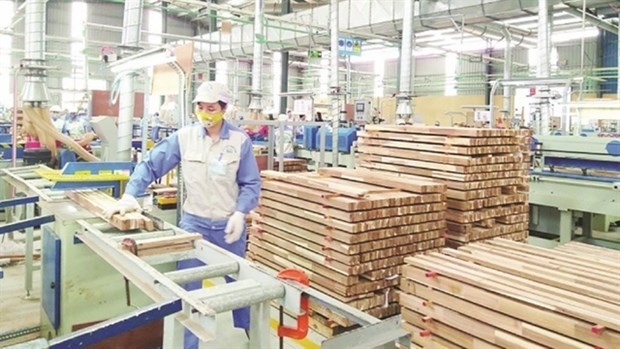Vietnam to find measures to mitigate effects of COVID-19 on investment and transport
Friday, February 28,2020
AsemconnectVietnam - According to the Ministry of Planning and Investment (MPI), Vietnam will optimize external resources to spur national economy as the impact of the outbreak of acute respiratory disease caused by a new coronavirus (COVID-19) on foreign investment flows into the country is visible.
The General Statistics Office (GSO) estimated that Vietnam would attract 39.6 billion USD in foreign investment in 2020 if the virus had not come. The amount would reach 12.1 billion USD in the first quarter, 8.4 billion USD in the second and third quarters, and 10.7 billion USD in the last three months.
However, the complex developments of the outbreak have prompted China -Vietnam’s biggest trade partner- to tighten its control of border gates and restrict exports and imports, thus greatly affecting production and foreign direct investment (IDI) in Vietnam this year.
China’s investment in Vietnam is forecast to halve during the January-March period and drop 30 percent in the next three months, which will exert impacts on investment flows from other countries, with decreases of 10 percent and 5 percent projected for the periods.
In the first quarter, the accumulative registered and additional capital and that for share purchase of foreign investors is expected to stand at only 10.3 billion USD, down 1.8 billion USD or 16.6 percentage points from the initial scenario.
Meanwhile, the sum is expected to reach 7.7 billion USD in the April-June period, down 0.66 billion USD, equivalent to 8.7 percentage points.
For the whole year, foreign investment in Vietnam is forecast to fall 2.46 billion USD, or a decrease of 6.8 percentage points from the initial scenario, of which capital from China will drop 1.01 billion USD, or 2.8 percentage points and that from other countries will slump 1.44 billion USD, or 4 percentage points.
The head of GSO Nguyen Bich Lam said coronavirus effects ripple through agriculture, industry, construction, trade and services. Therefore, the fragile production will hinder investment activities in both short and long terms, especially foreign-invested and non-State sectors.
The MPI said the worst impacts can be felt in such sectors as garment-textiles, footwear and leather, electronics, computer, optics, motor vehicle manufacturing and metal production that heavily rely on materials imported from China.
Due to the outbreak, potential foreign investors, including those from China, have canceled their trips to Vietnam to seek investment opportunities.
The production sector takes a hit as coronavirus leads to the lower demand for non-essential goods, and large stockpiles have made investors hesitant to implement their new business plans or increase capital for existing projects.
Other problems caused by Covid – 19
Another problem is personnel reduction in FDI projects as many Chinese officials, engineers and experts cannot enter Vietnam due to restrictions of flights, the MPI said.
Formosa Ha Tinh Steel Corporation, for example, has 7,500 laborers, of whom 700 hail from Taiwan (China). However, 500 laborers have yet to come back after their Lunar New Year (Tet) holiday due to Vietnam’s entry ban.
Besides, the company is facing a shortage of materials imported from China.
Like Formosa, LG Corporation of the Republic of Korea (RoK) said it will have no materials in service of production if COVID-19 is not curbed in the next two weeks.
Samsung Group, another conglomerate from the RoK, would have its business revenue halved as hundreds of its material containers have been stuck at the Lang Son border gate.
In the circumstances, the MPI has suggested stepping up the communication work to raise public awareness of COVID-19 and drastically fighting false information about the epidemic, Lam said.
The ministries, agencies and localities need to swiftly complete procedures for major multi-purpose public projects and deal with adverse impacts of climate change to support production and help people stabilize their lives.
The heads of ministries, agencies and localities should be more aware of their responsibility in order to soon kick-start important national projects like the North-South Expressway, Long Thanh International Airport, the coastal route from the northern province of Quang Ninh to the central province of Nghe An, and other transport and irrigation projects in the Mekong Delta region, he said.
Lam also proposed transform the investment model of some build-operate-transfer (BOT) projects to promote healthy public investment.
Nguyen Mai, President of the Vietnam’s Association of Foreign Invested Enterprises, proposed Vietnam make greater efforts to improve the domestic investment environment and help enterprises surmount COVID-19 impacts.
According to the MPI, Vietnam will work harder to lure multi-national groups and prestigious companies and brands, especially those from the areas that have strength in technology, capital and management skills like the US, the EU and Japan.
The Vietnamese Government has allowed customs clearance at border gates with tightened control of the disease, the ministry said.
Do Nhat Hoang, head of the MPI’s Foreign Investment Agency, said his agency will focus on high-tech sectors that may create breakthroughs and high added values such as new technology, pharmaceuticals, finance-banking, tourism, green technology and food processing.
The strategic target is to maximize external resources to boost national economic growth and speed up the process of industrialization and modernization, he said.
Impacts of COVID-19 and ways to mitigate
On February 27 Minister of Transport Nguyen Van The chaired a conference to seek measures to counter difficulties caused by the COVID-19 epidemic.
Minister of Transport Nguyen Van The chaired a conference on February 27 to seek measures to counter difficulties caused by the COVID-19 epidemic.
At the conference, the minister underlined the strong impacts of COVID-19 on the transport sector. The sudden suspension of flights to mainland China has put great pressure on airlines. Railway, land and waterway transport are also affected.
Director General of the Civil Aviation Administration of Vietnam (CAAV) – Dinh Viet Thang said the aviation market began to plummet at the end of January.
As of February 26, Vietnamese airlines had stopped all flights to China, cut 34 percent of flights to Taiwan (China) and 92 percent of flights to Hong Kong (China). While all 160 flights to Japan have been maintained so far, carriers are assessing the epidemic situation with a high possibility of having to reduce services in the coming period. The number of flights to the Republic of Korea has also been reduced by 41 percent.
According to Thang, in the best scenario with the epidemic contained before April, Vietnam’s airlines would transport 48 million passengers, down 9.2 percent year on year.
In the worse scenario with the epidemic put under control before June, and all flights to the RoK suspended, Vietnamese carriers would transport 45.7 million passengers, down 17 percent.
To support domestic carriers in coping with negative effects of COVID-19, the CAAV recommended that the Ministry of Transport ask the Government to provide subsidy for aviation service fees for local airlines from March 1 to May 31 this year.
It also suggested creating conditions for aviation service suppliers to reduce fees for airlines and other service users.
In addition, the CAAV proposed the exemption of import tariff and environmental tax for aviation fuel for three months, the delay of tax and budget contributions for airlines, and easing visa policies for foreign visitors.
Director of the Transport Department Tran Bao Ngoc reported on the problems faced by land, railway and waterway transport.
The number of passengers in land transport in February went down by 16.3 percent from the previous month, while that of railway plunged 45 percent from January and 47.4 percent from one year ago.
Domestic maritime firms have also reported a 30 percent reduction in cargo volume compared to January and 17.8 percent in number of passengers.
Concluding the conference, the minister required relevant agencies to keep updated on the transport sector’s losses caused by impacts of the COVID-19 and swiftly consider the suggested measures. He asked airlines to consider opening new routes to densely-populated areas not affected by the epidemic.
CK
Source: VITIC/Vietnamplus.vn
Vietnam showing better-than-average growth: Indian expert
Vietnam works hard to boost exports to Chinese market
DAILY: Vietnamese pepper prices remained unchanged on March 24
Reference exchange rate down 15 VND
DAILY: Vietnamese coffee prices rose by 300 VND on March 24
Stock market violations to face stricter sanctions
Wood industry strives to regain growth momentum
Vietnam's exports to several ASEAN markets rebounded
Export turnover to the US in 2 months of 2023 reached 13 billion USD
DAILY: Vietnamese pepper prices remained unchanged on March 23
DAILY: Vietnamese coffee prices fell by 300 VND on March 23
Singaporean site highlights Vietnam’s potential for fintech growth
Vietnamese coffee finds ways to gain foothold in RoK market
Dragon fruit export turnover reaches 47 million USD

Plan on implementing Decision No. 327/QD-TTG dated March ...
Concretize viewpoints, objectives, tasks and solutions of the plan in accordance with practical conditions of the locality, associating ...Plan on implementing national environmental protection ...
Implementation plan of marine aquaculture development ...
Program on conservation and development of Vietnamese ...
Plan on improving quality of human resources to 2025 and ...

Efforts taken to turn culinary culture into national ...
The Vietnam Cuisine Culture Association (VCCA) is taking steps to implement a project to build and develop Vietnamese culinary culture ...Vietnamese cuisine making a name for itself with ...
Vietnam advance to next round of AFC U20 Women’s Asian Cup
Cultural tourism and traditional values promoted through ...



